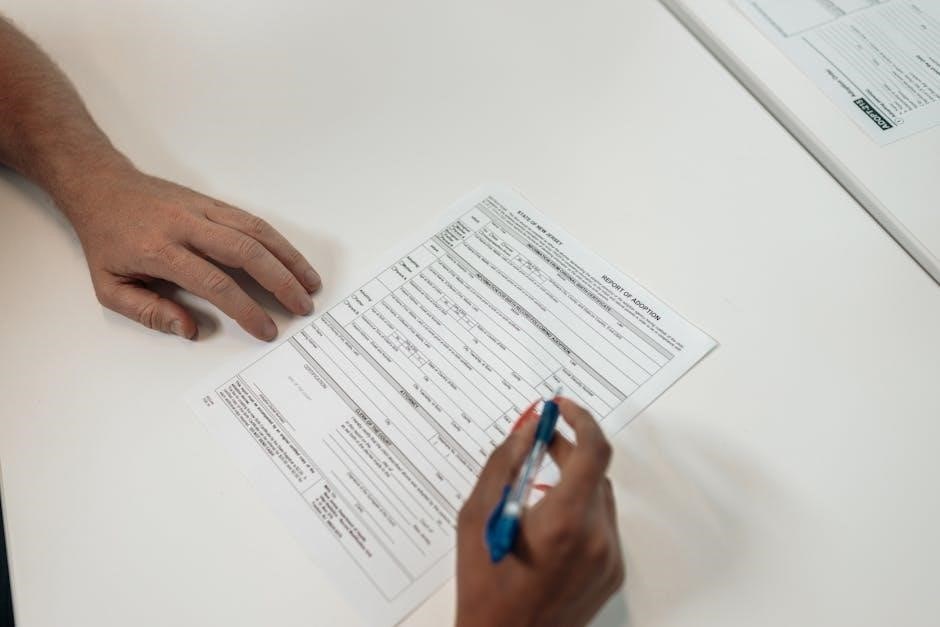Applying to sixth form is a significant step in your educational journey. This guide provides essential information to help you navigate the application process smoothly and successfully.
Overview of the Sixth Form Application Process
The sixth form application process involves several key steps, starting with researching the institution and its offerings. Students must complete an application form, which typically includes personal details, academic history, and course preferences. A personal statement is often required, highlighting achievements, interests, and career goals. Supporting documents, such as academic records and references, are also necessary. The process may include interviews or assessments, and submission must be made by the specified deadline. Proper preparation and attention to detail are crucial for a successful application.
Importance of a Well-Structured Application Form
A well-structured application form is essential for making a strong first impression. It ensures clarity and professionalism, allowing admissions teams to easily assess your suitability for sixth form study. A clear and organized format highlights your academic strengths, extracurricular achievements, and personal qualities. Proper presentation demonstrates attention to detail and commitment, which are valuable traits for sixth form success. By structuring your application effectively, you can showcase your potential and stand out among other applicants. This is your opportunity to present yourself in the best possible light.

Eligibility Criteria
Eligibility for sixth form typically includes meeting academic requirements, age criteria, and residency conditions. These criteria ensure applicants are suitably prepared for advanced study.
Academic Requirements for Sixth Form Entry
Academic requirements for sixth form entry typically include achieving strong GCSE grades, often grades 8/9 for competitive subjects. Demonstrating a commitment to learning and meeting behavioral expectations are also crucial. These criteria help identify students ready for the challenges of sixth form studies, ensuring they are well-prepared for advanced courses like A-levels and future academic pursuits.
Age and Residency Requirements
Most sixth form institutions require applicants to be between 16 and 18 years old by the start of the academic year. Residency requirements may vary, but students must typically reside in the UK or the specific region served by the institution. Proof of age and residency, such as a birth certificate or passport, is often requested during the application process to ensure eligibility. These criteria help schools comply with legal and administrative standards.

Required Documents
Key documents include a valid passport, birth certificate, recent photograph, academic records, and references. Additional materials like a personal statement may also be requested.
Personal Identification Documents
Applicants must submit a valid passport, birth certificate, and a recent photograph. The birth certificate should show parental details, while the passport verifies nationality and identity. These documents ensure eligibility and residency requirements are met, providing essential verification for your application. They are crucial for processing and must be submitted alongside other materials. Ensure all documents are up-to-date and clearly legible to avoid delays in the review process.
Academic Records and References
Submit your most recent school reports, GCSE results, and predicted grades. Academic references from teachers are also required to assess your suitability for sixth form. These documents provide insight into your academic performance and potential. Ensure all records are up-to-date and include detailed predicted grades if applicable. References should highlight your strengths, work ethic, and suitability for chosen subjects. Organize these documents neatly and verify their accuracy before submission to avoid delays in processing your application.
Supporting Materials (Personal Statement, Photograph)
A personal statement is a critical component of your application, showcasing your academic aspirations, career goals, and reasons for choosing the sixth form. It should be 800-, highlighting your achievements, skills, and commitment to your chosen subjects. Include a recent passport-sized photograph to complete your application. Ensure your personal statement is well-structured, original, and reflects your genuine interest in furthering your education. This document helps admissions teams assess your suitability and potential for success at sixth form level.

Application Form Structure
The application form typically includes sections for student information, academic background, and course preferences, ensuring a comprehensive overview of your qualifications and interests for sixth form entry;
Student Information Section
The student information section requires your full name, date of birth, and address. Use block capitals for clarity. Include your contact details and a recent photograph. Ensure all personal details are accurate and match your identification documents. This section sets the foundation for your application, so double-check for errors before submission. Proper formatting, such as using block capitals, is essential to meet the application standards. Accuracy in this section is crucial for processing your application efficiently.
Academic Background and Achievements
This section highlights your academic journey and accomplishments. Include your GCSE grades, any notable awards, or academic recognitions. Mention extracurricular activities or leadership roles that demonstrate your skills and character. Be concise but detailed, ensuring your achievements align with the sixth form’s expectations. Avoid exceeding and focus on showcasing your academic potential and personal growth. This section helps admissions teams assess your suitability for their programs.
Course Selection and Preferences
When selecting courses, choose subjects that align with your academic strengths and future career goals. Consider your GCSE performance and the entry requirements for each course. List your preferences in order of priority, ensuring they match the sixth form’s offerings. Be clear about why you are interested in these subjects. If applicable, indicate your intention to study four subjects, but only if you are likely to achieve high grades. Research the courses thoroughly to make informed decisions that align with your aspirations.

Personal Statement Guidelines
Your personal statement should demonstrate passion, commitment, and future goals. Highlight academic achievements, skills, and experiences. Ensure it is well-structured, concise, and tailored to your chosen courses.
Key Elements of a Strong Personal Statement
A strong personal statement should highlight your passion for your chosen subjects, showcase academic achievements, and demonstrate commitment to your future goals. Include relevant extracurricular activities, skills, and experiences that reflect your dedication and character. Clearly articulate why you are suited for your selected courses and how they align with your career aspirations. Ensure your statement is well-structured, concise, and free of errors, providing a compelling narrative that sets you apart from other applicants.
Common Mistakes to Avoid
- Not proofreading for spelling and grammatical errors, which can create a negative impression.
- Submitting a generic personal statement without tailoring it to the specific sixth form.
- Missing deadlines or failing to complete all sections of the application form.
- Including irrelevant information that does not showcase your strengths or suitability.
- Exceeding the word limit or providing insufficient detail in critical sections.
Ensure your application is polished and adheres to the guidelines provided.
Examples of Effective Personal Statements
A strong personal statement highlights academic strengths, career goals, and personal motivations. For example, a science-focused applicant might write: “I am passionate about biology and chemistry, aiming to pursue a career in medicine. My GCSE results reflect my dedication, and I am eager to develop advanced skills at sixth form.” Another example: “I am excited to join ArtsEd Sixth Form to explore my love for drama and music. My involvement in school plays and choir demonstrates my commitment to the arts.”
These examples are concise, personalized, and relevant to the chosen path.
Submission and Deadlines
Adhering to application deadlines is crucial. Most sixth form applications must be submitted by specific dates, often in late January or early February. Ensure timely submission.
Application Deadlines and Key Dates
Meeting application deadlines is critical to secure your place. Most sixth forms set deadlines in late January or early February. Submitting on time ensures consideration for limited spots. Key dates include application submission, acknowledgment receipts, and interview schedules. Missing deadlines may result in delayed processing or lost opportunities. Schools often publish specific timelines, so check their websites or contact admissions for exact dates. Plan ahead to avoid last-minute issues and ensure your application is reviewed promptly.
Submission Methods (Online vs. Offline)
Most sixth forms offer online application options, allowing students to submit forms digitally. This method is efficient, reduces errors, and provides confirmation of receipt. Offline submissions may involve printing, completing, and mailing the form or delivering it in person. Some schools accept email submissions, while others require paper copies. Ensure you follow the school’s specific guidelines. Online platforms often require creating an account, while offline methods may need additional documentation. Verify the submission method with the school to ensure compliance with their requirements.

Post-Submission Process
After submitting your application, the sixth form team reviews your form and supporting documents, assessing eligibility and fit for the chosen courses and institution.
Review and Assessment of Applications
The sixth form team thoroughly reviews each application, assessing academic performance, personal statements, and references. They evaluate alignment with course requirements and institutional goals. The process ensures fairness and transparency, with decisions based on merit and potential. Applications are reviewed holistically, considering individual circumstances. Shortlisted candidates may be invited for interviews or assessments to further evaluate suitability. This step ensures the best fit for both the student and the sixth form program, fostering a supportive and challenging environment.
Interviews and Assessments
Interviews and assessments are crucial steps in the sixth form application process. They provide an opportunity for the admissions team to evaluate a candidate’s suitability for their chosen courses. During interviews, applicants may discuss their academic goals, personal statement, and subject interests. Assessments, such as entrance exams or reviews of academic records, help determine a student’s readiness for advanced studies. Preparation is key, as these evaluations play a significant role in the final admission decision.
Acceptance and Next Steps
Upon acceptance, students complete enrollment and attend orientation to prepare for sixth form studies. These steps ensure a smooth transition and readiness for the academic challenges ahead.
Receiving an Offer
Once your application is reviewed, you will receive an offer letter outlining the terms of your acceptance. Review the offer carefully, ensuring it includes your selected courses and any conditions. If you meet the criteria, confirm your acceptance by the specified deadline. This typically involves signing and returning the acceptance form or completing an online confirmation. Keep a copy for your records. Receiving an offer is a significant achievement, and fulfilling any conditions ensures your place is secured for the upcoming academic year.
Enrollment Process and Orientation
Upon receiving your offer, the enrollment process begins with completing necessary forms and verifying documents like your ID and academic records. Orientation typically includes meetings with teachers, campus tours, and introductions to school policies. This is a great opportunity to meet fellow students and familiarize yourself with the environment. Ensure all paperwork is submitted by the deadline to secure your place. After orientation, you’ll receive a schedule and details for the first day, helping you prepare for a smooth transition into sixth form life.

Frequently Asked Questions
This section addresses common queries about deadlines, required documents, and submission methods, helping applicants navigate the process efficiently and clarify any concerns they may have.
Common Queries About the Application Process
Applicants often ask about deadlines, required documents, and submission methods. They also inquire about personal statement guidelines and how to select courses. Additionally, questions arise about eligibility criteria, such as academic requirements and age restrictions. Some students seek advice on what to expect during interviews or assessments. Clarifying these queries ensures a smooth application process. It’s essential to review the form carefully to avoid errors and seek support from teachers if needed. Understanding these aspects helps applicants present their best selves and meet expectations effectively.
troubleshooting Tips for Applicants
Troubleshooting Tips for Applicants
If you encounter issues with your application, start by reviewing the form for errors or missing sections. Ensure all deadlines are met to avoid delays. If uploading documents is problematic, try using a different browser or device. For personal statement challenges, seek feedback from teachers or mentors. Double-check required documents, such as ID and references, before submission. If unsure about course selections, consult academic advisors. Lastly, save your progress regularly and submit the form well before the deadline to avoid technical issues.
A well-prepared application enhances your chances of success. Stay organized, meet deadlines, and showcase your strengths to secure your place in sixth form and beyond.
Final Tips for a Successful Application
To ensure a successful sixth form application, proofread your form carefully and submit it before deadlines. Highlight your strengths, such as good attendance and behavior, as these demonstrate commitment. Clearly outline your academic goals and how the sixth form will help you achieve them. Attach all required documents, including your birth certificate, passport, and personal statement. Ensure your personal statement is tailored to your chosen subjects and reflects your passion for learning. Seeking feedback from teachers can also improve your application’s quality. By presenting a polished and thoughtful application, you enhance your likelihood of securing a place. Stay organized and thorough throughout the process to make a positive impression.
